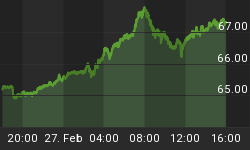China’s formerly high-flying stock markets have taken a severe battering this year, with the Shanghai stock market continuing its deep slide on Monday after slipping 2.5 percent, a two-year low just days before U.S. tariffs on China exports take effect.
The Shanghai Composite is down 22 percent in the YTD, marking the worst start to an year since 2015.
Meanwhile, the blue chip CSI300 index fared even worse after losing 2.9 percent on the day.

(Click to enlarge)
Source: Google
Chinese equities, however, are hardly the only market that’s feeling the heat of the U.S.-China trade wars.
The yuan, fresh off its worst month on record, retreated another 0.5 percent to an eight-year low thus extending its losses against the dollar this year to six percent.
Trade tensions between the two countries are expected to take a big knock on the Chinese economy.
To a certain extent, that appears to be already happening. Related: Canada Hits Back At U.S. With $12.5 Billion In Tariffs
China’s purchasing manager index for the month of June showed a decline in export orders. That marked the third straight decline in new export orders--a worrying trend and a sobering reminder that the fallout and simmering trade wars could quickly blow out of proportion.
Meanwhile, actions by the Beijing are only helping to fan the flames. There are fears that the government might impose additional property controls, which has been weighing on developer shares.
Shanghai’s property stock index fell 5.4 percent, with top players bearing the brunt of the selloff. Poly Real Estate Group shares suffered carnage after tumbling 9.8 percent while those by peer Gemdale Corp. losing 6.3 percent. Developers have come under pressure as the government steps up measures to curb rampant real estate speculation and rein in on international bond issuance.
Lat year, several second-tier cities in China banned investors from selling newly bought homes for the first five years in a bid to cool overheating home property sales. Although the bans have been painful for property investors, they are deemed necessary to prevent a housing bubble from forming.
China Could Struggle to Attract Foreign Investment
Perhaps in a tell-tale signs that company coffers could be drying up, Nissan Motor has called off a potential $1 billion sale of its electric car battery unit to China’s GSR Capital citing lack of funds by the Chinese investment firm. The deal has been delayed for months with chances of finding another buyer slim since the plant is not cutting-edge.
The second-largest Japanese automaker has been looking to sell its AESC (Automotive Energy Supply Corp) plant to pave way for the procurement of low-cost, high-performing lithium batteries in a bid to compete with the likes of Tesla.
Just two days ago, Tesla announced that it had achieved a key milestone to produce 5,000 EVs per week, and remained on track to hit the 6,000k mark in a matter of months. Tesla says it will be able to eke a profit from Model 3’s modest $35,000 price point thanks to being one of the lowest-cost battery makers.
Related: The Global Trade War Intensifies
The ongoing stock market rout does not augur well for a country that has been desperately trying to attract more foreign investments.
China’s foreign direct investments growth has plunged from nearly 11 percent after the country joined the World Trade Organization (WTO) to just four percent currently.
Even more alarming is the fact that investment flows into the country tend to diminish rapidly whenever the stock market crashes.
By Alex Kimani for Safehaven.com
More Top Reads From Safehaven.com:
















